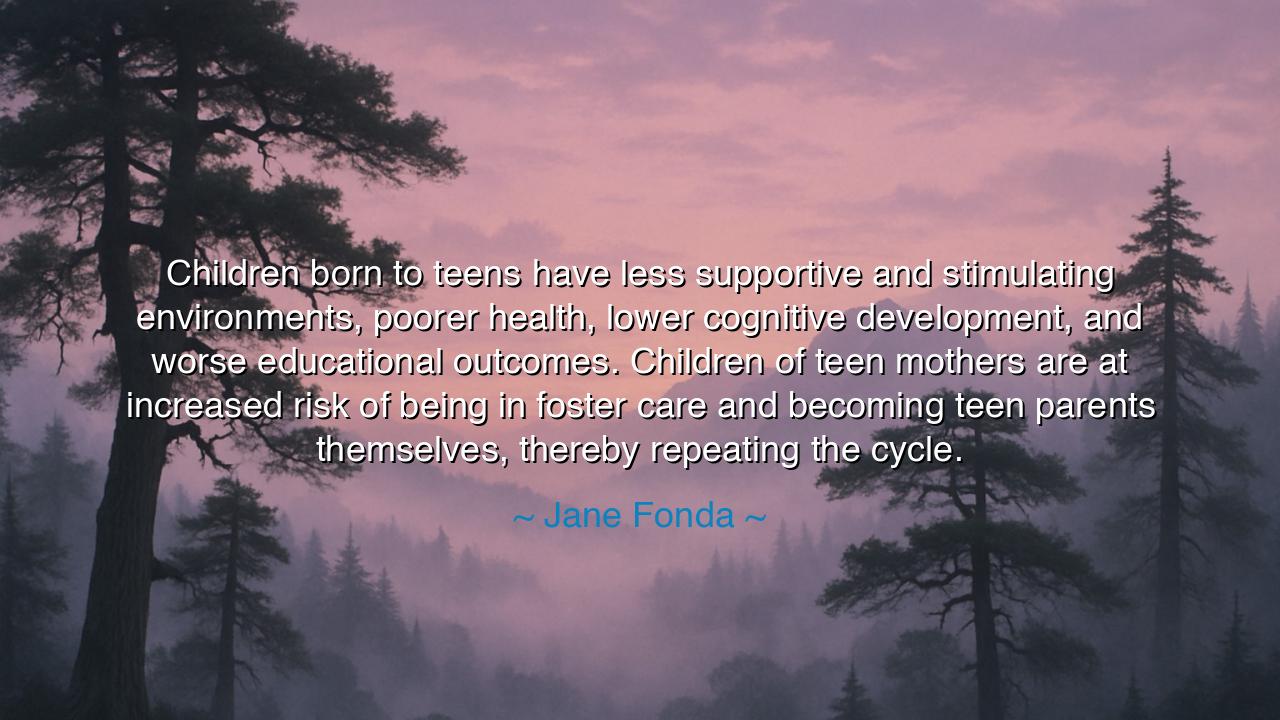
Children born to teens have less supportive and stimulating
Children born to teens have less supportive and stimulating environments, poorer health, lower cognitive development, and worse educational outcomes. Children of teen mothers are at increased risk of being in foster care and becoming teen parents themselves, thereby repeating the cycle.






Jane Fonda once declared with sobering clarity: "Children born to teens have less supportive and stimulating environments, poorer health, lower cognitive development, and worse educational outcomes. Children of teen mothers are at increased risk of being in foster care and becoming teen parents themselves, thereby repeating the cycle." These words do not spring from condemnation, but from compassion and concern for the lives of the young—both the mothers and the children. In them lies the recognition of a cycle, a chain of hardship that can pass from one generation to the next if it is not broken with intention, guidance, and support.
The origin of her words lies in Fonda’s deep involvement in social activism, particularly around issues of women, families, and youth. Drawing from research, advocacy, and lived stories, she raises a warning that teen pregnancy, while often romanticized or dismissed in culture, carries consequences that ripple outward far beyond the individual. Her insight is not merely statistical—it is moral and human. For she reminds us that when a young mother is ill-prepared and unsupported, the child bears the weight of that struggle, and so the cycle of hardship continues.
History has shown us many such cycles. Consider the plight of orphans in industrial England, children born into poverty and neglect, who often grew up only to repeat the same struggles as their parents. Without intervention—without education, guidance, or opportunity—the cycle endured. Or recall the story of Franklin D. Roosevelt’s New Deal, which recognized that poverty itself was generational, and that without systemic change, children born into hardship would inherit not only the struggles of their parents but the limitations of their environment. Fonda’s words echo this truth: cycles, once set in motion, rarely break themselves.
Her statement also brings to light the sacred responsibility of society and community. The burden should not rest solely upon the young mother, nor solely upon the child. It is for families, neighbors, teachers, and leaders to step in, to offer mentorship, resources, and support. A teen mother is not merely a statistic, but a soul in need of guidance, and her child is not doomed by fate but may yet flourish if given the chance. Fonda’s warning thus becomes a call to action: to lift the vulnerable before they sink deeper into the tide of repetition.
Yet within her words lies also a message of hope. For if cycles can be repeated, they can also be broken. When love, education, and opportunity are poured into the life of a child born to struggle, that child may become the very one who breaks the chain. History gives us many examples: leaders, artists, and thinkers who rose from difficult beginnings because someone intervened, because someone believed, because someone opened a door that had been closed for generations. The cycle is not destiny—it is challenge.
The lesson for us is this: never dismiss the power of intervention, never underestimate the impact of support. If you encounter a struggling teen mother, do not condemn but assist. If you see a child caught in hardship, do not look away but offer what guidance you can. The smallest gesture—an encouraging word, a helping hand, a lesson taught—can plant seeds that change the course of generations. To turn away is to allow the cycle to continue; to step forward is to help write a new story.
Therefore, children of tomorrow, let Jane Fonda’s words be engraved upon your hearts. Recognize the cycles that entrap, but do not see them as unbreakable chains. See them as challenges placed before you, waiting for compassion, wisdom, and action to shatter them. For every cycle broken is not just the liberation of one soul, but the liberation of generations yet unborn. The past may echo, but it does not have to rule the future—if we dare to intervene with love, courage, and vision.






AAdministratorAdministrator
Welcome, honored guests. Please leave a comment, we will respond soon